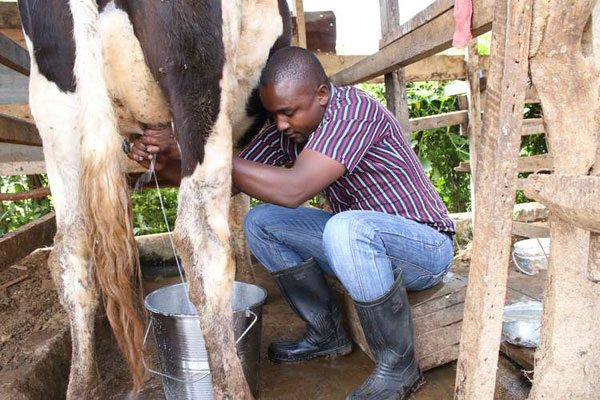The following guide is by Musyoka Duncan.
With demand for milk rising rapidly, many people are venturing into commercial dairy farming having seen the business opportunity. Below I have a checklist of things you need to consider before ploughing your cash into dairy farming.
Capital: Ask yourself how much money you need for the investment? What is the source and how much can you access as quick as you want? Dairy investments are capital-intensive. The structures to build on the farm and equipment you buy has little or no alternative, thus, you need a good capital. Develop a plan for final farm set up considering the expected running capacity.
Land: The size, location and potential determine the type and size of investment to be set up. You need space to house the animals, grow fodder and dispose waste.
Market research: Do a market survey and decide on the target buyers. Also decide whether to go for milk or heifer market, or both. The business needs to be solvent hence you should always choose options that maximise your returns.
Ecological zone: From the farm’s ecological location, determine the type of fodder and animals that do well. Exotic dairy breeds will require cool environment while crosses of these breeds with local ones like Sahiwal may withstand some level of harsh conditions. In arid and semi-arid regions, look for local breeds like Sahiwal or their first cross with exotic breeds.
Production system and the level of management: Always fit the production system with resource available and management. Intensive production systems are best for efficient utilisation of resources. In such systems, animals are enclosed and the land is set aside for fodder production.
Follow regulations: Always consider the rules and regulations that govern the establishment of dairy investment. Also think of waste disposal mechanisms and environment pollution more so on water ways, sound and air.
Labour: Management and costing of labour remains a mystery to many farmers. Consider the type of work and the form of labour required. Have permanent employees for duties that run across the year and casuals for seasonal work. Remember some services are cheap when outsourced. Proper choice of labour will increase your savings, relieving unnecessary stress.
Water: It is required for animals to drink, cleaning of equipment, the dairy unit and growing fodder. A dairy cow will drink between 40 to 80 litres of water per day.
Breed: Decide on the breed and grade of animals to start with by considering the management level to be adapted. For beginners, consider starting with second or third dairy crosses rather than the high-bred animals. Adapt a breeding programme that will improve next generation of animals.
Source of breeding stock: Select from the existing herd and upgrade with time. Outsourcing breeding stock rule of thumb is “never buy animals from herds that are managed beyond your potential, such animals will always disappoint you”. Check on the animal’s pedigree, production and health records and the dam’s production record if any. At times you may require a professional to inspect the animal.
Feeds production and conservation: Feeding comprises of the highest cost in confined herds and cheapest in free grazed system with little supplementation. Always adapt to economical and efficient feeding production and utilisation programme. Reduce cost of feeds by growing your own. If land is small, consider renting to grow fodder. Buy fodder at the harvesting season and put in place conservation measures like silage and hay making.
Feeding the animals: Chop feeds to reduce wastage and make it easy for the cow to handle. Soak feeds with molasses mixed with water overnight to make them soft and palatable. If possible, feed a balance ration and water. Total Mixed Rations (TMR) are the best but one needs assistance from qualified nutritionists.
Health management: Put in place mechanisms for early disease detection, prevention and treatment. Develop and adopt a vaccination programme, regular dipping and deworming of animals to control diseases. Visit the livestock and veterinary office for advice if need be and possibly identify a qualified reliable veterinarian to work with.
Recordkeeping: Set up and keep all necessary and updated farm records on production, breeding, sales, purchases, feed sources and other transactions at the farm. Regularly analyse them and evaluate the enterprise performance.
The list is a reflection of the key important issues that need to be considered. Always seek for detailed information and guidelines from professionals and relevant authorities.









